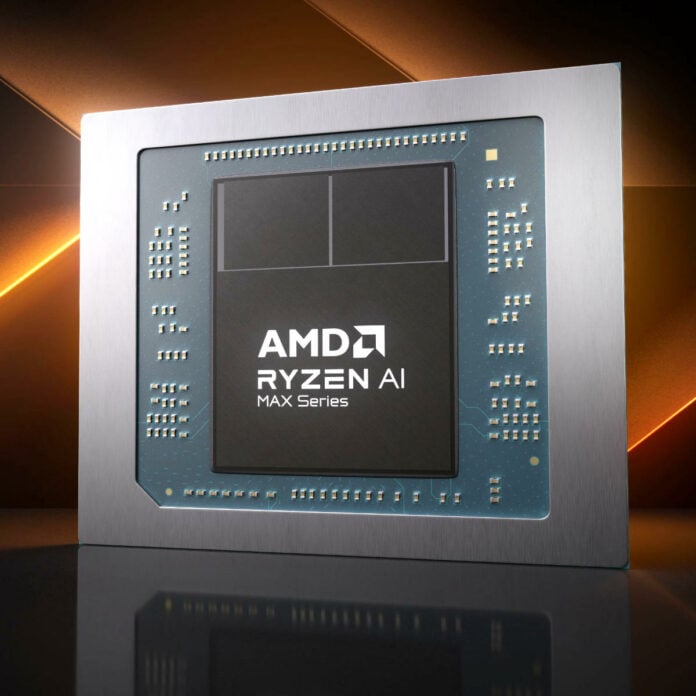AMD has a wealth of AI chips in store this CES, from expanding its successful Strix Point family to welcoming its more mainstream Ryzen 200 Series. However, none are more exciting than its brand-new Ryzen AI Max+, built with workstations and micro-desktops in mind.
Dubbed “the most advanced mobile x86 processor ever created,” it features up to 16 Zen 5 performance cores alonside a 50 TOPs XDNA 2 NPU (neural processing unit). It’s the 40 RDNA 3.5 Compute Units that catch my eye, though, tied together with unified coherent memory architecture that can access up to 96GB for graphics at 256GB/s bandwidth. This is unprecedented and easily the most powerful integrated graphics we’ve seen in the Windows ecosystem.
| Ryzen AI Max+ 395* | Ryzen AI Max 390* | Ryzen AI Max 385* | Ryzen AI Max 380* | |
|---|---|---|---|---|
| Cores / threads | 16/32 | 12/24 | 8/16 | 6/12 |
| Boost clock | 5.1GHz | 5.0GHz | 5.0GHz | 4.9GHz |
| L3 cache | 80MB | 76MB | 40MB | 22MB |
| NPU | 50 TOPS | 50 TOPS | 50 TOPS | 50 TOPS |
| cTDP | 45-120W | 45-120W | 45-120W | 45-120W |
| Availability | Q1-Q2 2025 | Q1-Q2 2025 | Q1-Q2 2025 | Q1-Q2 2025 |
Translating this to performance, AMD claims its flagship decimates Intel Core Ultra 9 288V, offering up to 402% performance in Blender Classroom and an average of 2.6 times the rendering performance across all apps tested. Graphics see similar results with a 258% leap over its rival in Steel Nomad and an average of 1.4 times faster visuals across the board.
Ryzen AI Max+ 365 loses its first fight against Mac M4 Pro 14C in Cinebench 2024 nT, which is no surprise considering Apple is still largely the gold standard, but it’s only by a measly 3%. Otherwise, Team Red storms the castle in Blender Classroom, Corona, and Vray with an 86% lead.
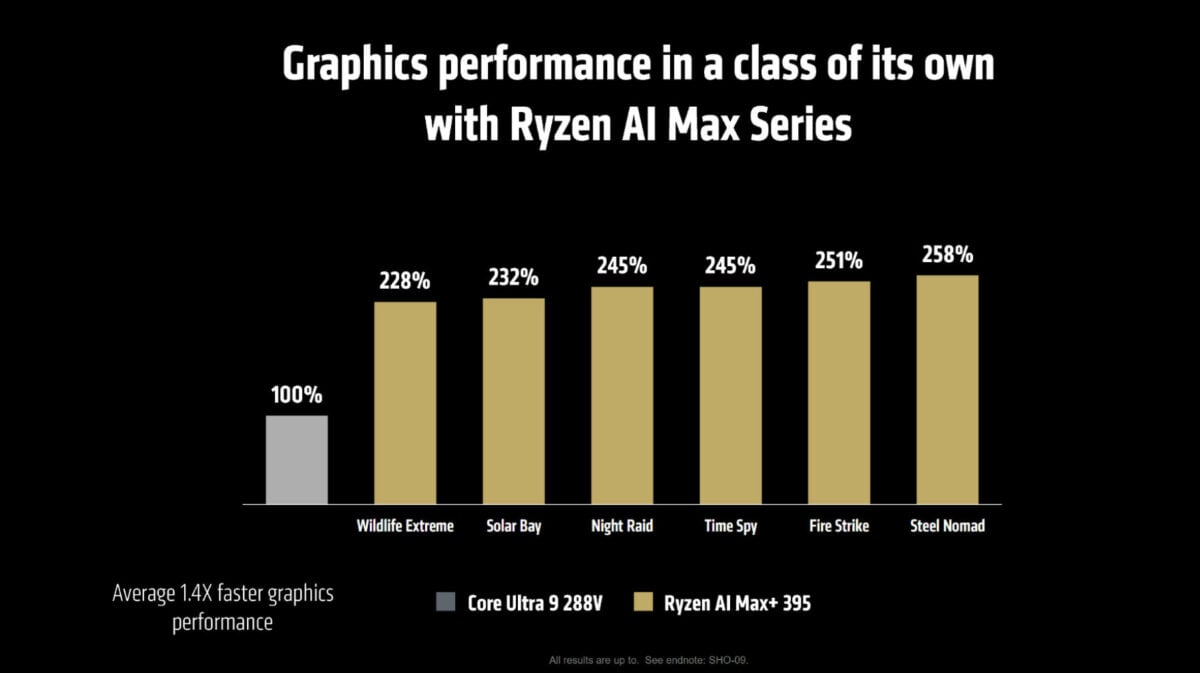
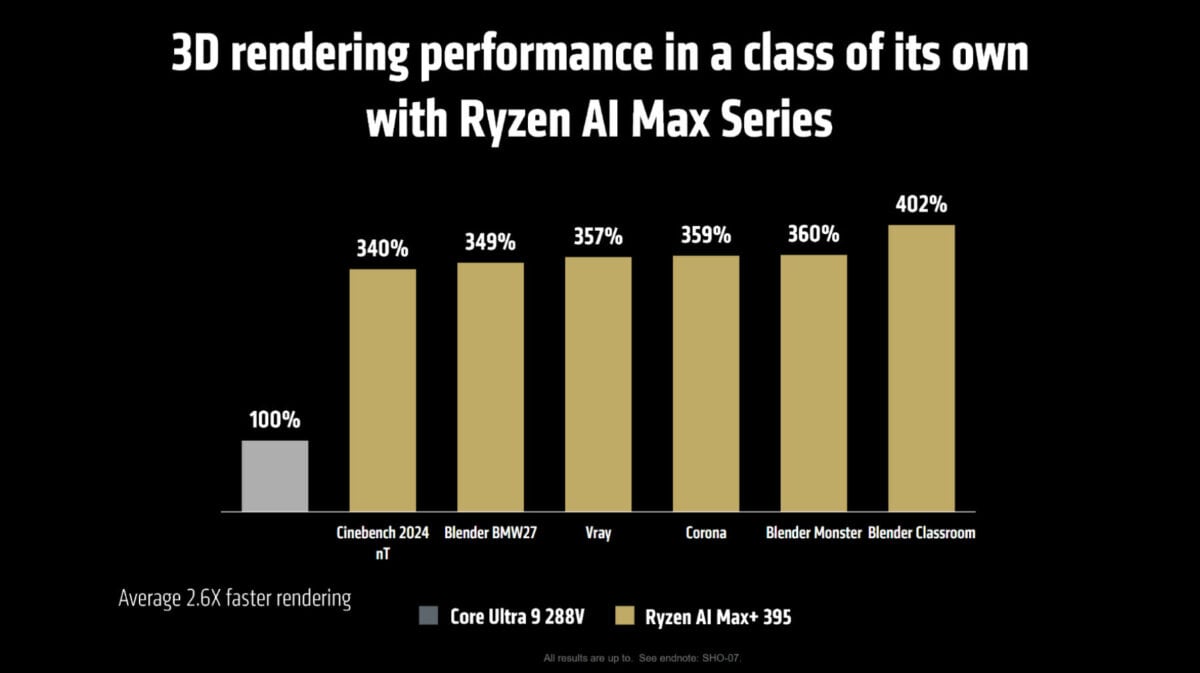
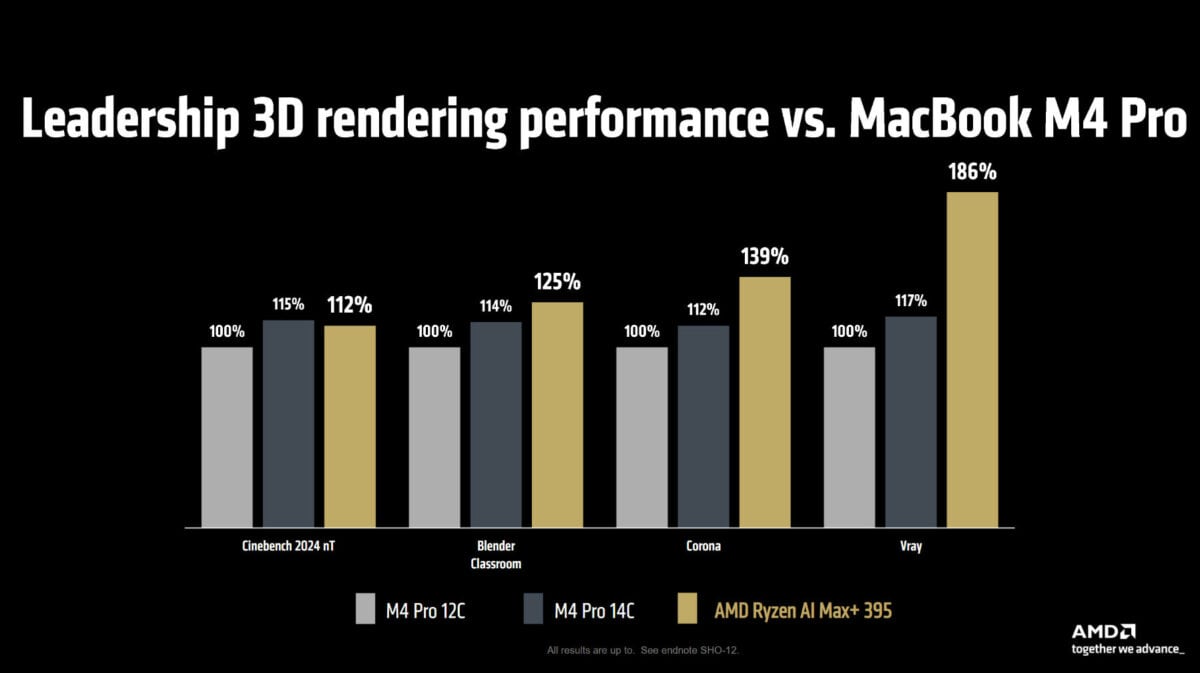
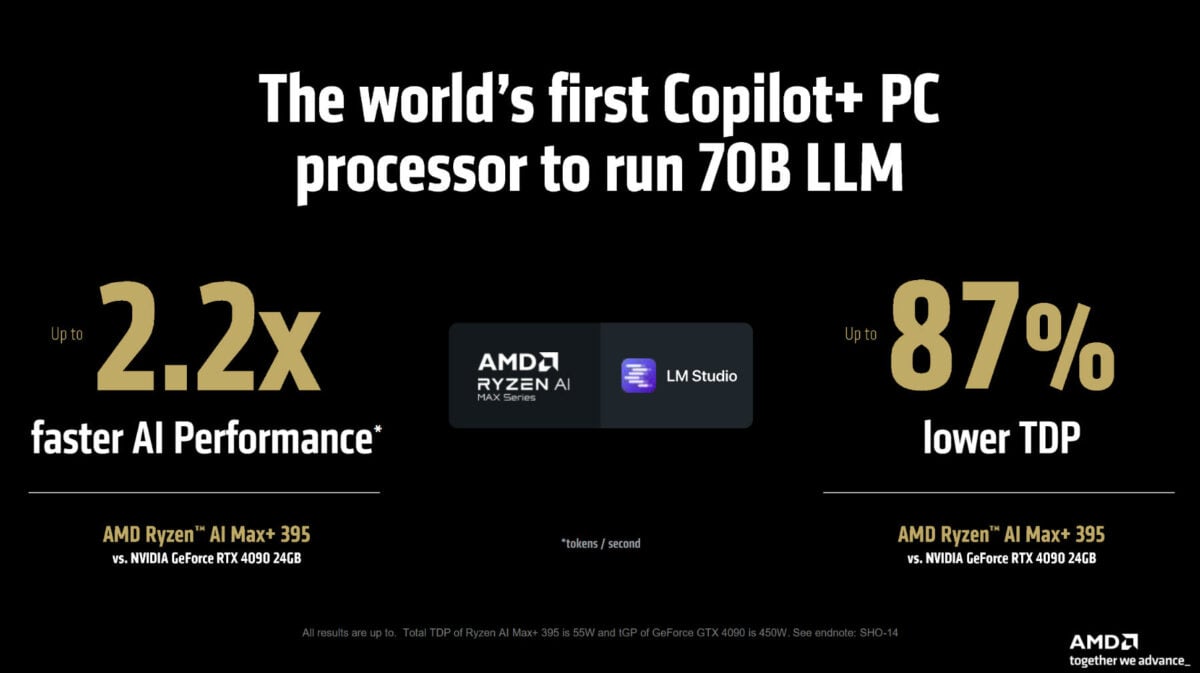
Perhaps the most eye-opening figures come from its comparison with Nvidia GeForce RTX 4090. While discrete graphics cards usually run rings around NPUs in high-precision AI workloads, AMD promises up to 2.2 times faster AI performance with 87% lower power draw in a 70 billion parameter LLM (large language model), like Llama 3.3. This all comes down to its unified memory, as 96GB eclipses the 24GB available in Team Green’s Ada Lovelace champ.
Not bad at all for a 55W chip, but keep in mind that these are AMD’s cherry-picked results with an extremely small sample size of tests. We’ll know more come the chip’s release in the first or second quarter of 2025 as it starts to appear in Asus, Gigabyte, and MSI laptops.
Overall, standard and pro models are identical in hardware, with the only difference lying in security. AMD offers 18 months of planned software stability and 24 months of availability, alongside enhanced platform validation process to ensure everything ticks along like it’s supposed to. Considering the rise in AI-enhanced attacks, it pays to be as secure as possible in all endeavours.
Ryzen AI 300 Pro CPUs
Building on its Strix Point family of processors that originally debuted in July 2024, AMD has also welcomed Ryzen AI 7 350, Ryzen AI 5 340, and their Pro variants into the fold. The aim is to make artificial intelligence more accessible to everyone with slimmer layouts than the premium AI 9 Series to keep costs down.
| Ryzen AI 7 350* | Ryzen AI 5 340* | Ryzen AI 9 365 | |
|---|---|---|---|
| Cores / threads | 8/16 | 6/12 | 10/20 |
| Boost clock | 5GHz | 4.8GHz | 5GHz |
| L3 cache | 24MB | 22MB | 24MB |
| Peak TOPS | 50 | 50 | 50 |
| cTDP | 15-54W | 15-54W | 28-54W |
| Availability | Q1 2025 | Q1 2025 | Released |
Ryzen AI 7 350 and its Pro counterpart feature near-identical specs to Ryzen AI 9 365. You can expect a 50 TOPS XDNA 2 NPU (neural processing engine), 5GHz frequencies, and 24MB L3 cache. The only differences are its smaller eight-core, 16-thread arrangement and conservative base 15W TDP, but you can crank the power all the way to its 54W ceiling.
At full whack, Team Red boasts that Ryzen AI 7 350 has the fastest productivity in-class, beating Core Ultra 7 258V by an average of 30% and Qualcomm X Plus X1P-42-100 by 35%. Given AMD has only tested across nine different apps, your mileage may vary, but these do include a clean sweep across Cinebench 2024, Handbrake, and Blender Classroom.
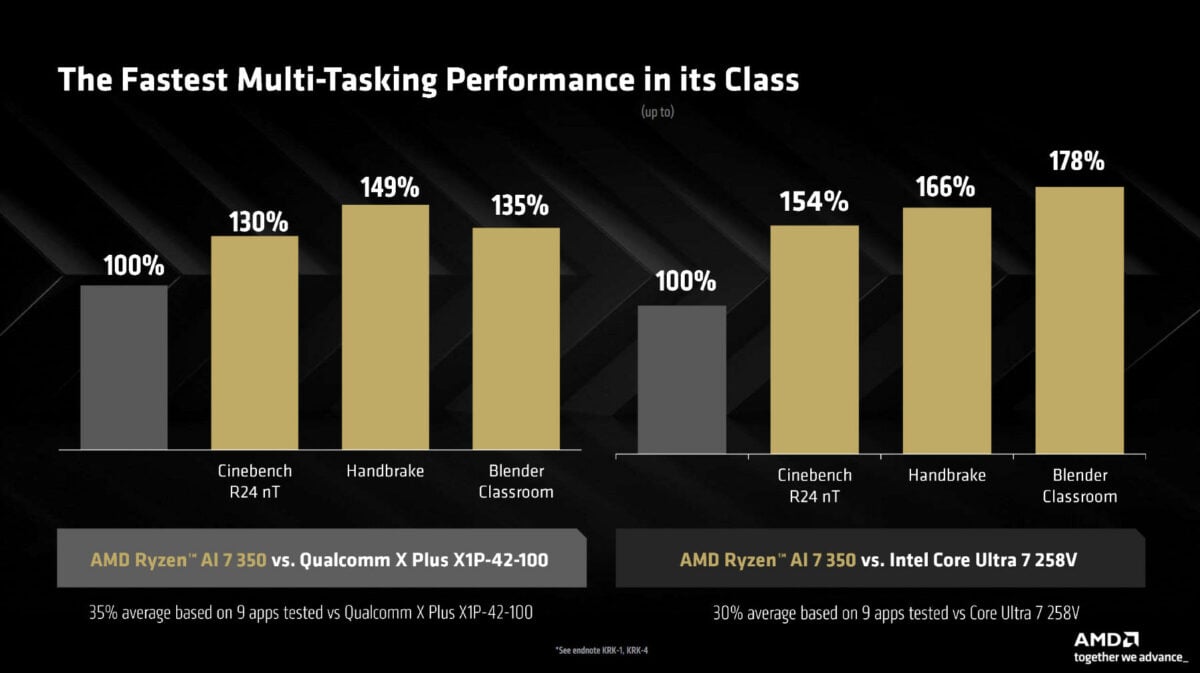
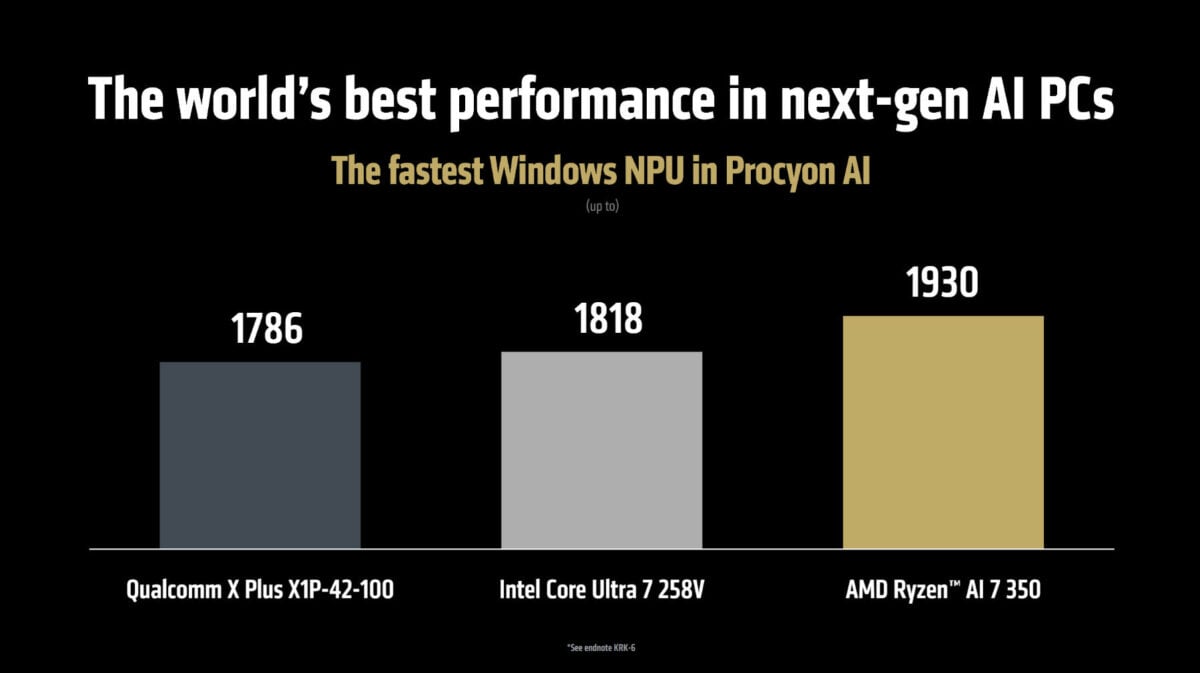
You might expect such a performance uplift to come at the expense of battery life, but laptops packing Ryzen AI 7 350 should last over 24 hours on video playback. More intense tasks will deplete it quicker, but this generally raises the bar. I, for one, suffered at the hands of the battery gods last CES, fighting for the nearest power outlet, so it’s refreshing to see such long-lasting devices.
You’ll spot Ryzen AI 7 350 and Ryzen AI 5 340 inside mobile platforms at some point in Q1 2025, with Pro versions following shortly after in Q2 2025.
AMD Ryzen 200 Series
Finally, shining a spotlight on the mainstream consumer segment, AMD has 11 new Ryzen 200 models flooding the market come Q2 2025.
AMD hasn’t shared any figures of what kind of performance to expect, but they won’t come close to the same AI capabilities as their 300 Series cousins. Instead, they’re meant to lower the cost ceiling in order to put light AI workloads into everyone’s hands. The more, the merrier.
| Cores / threads | Boost clock | L3 cache | NPU | cTDP | |
|---|---|---|---|---|---|
| AMD Ryzen 9 270 | 8/16 | 5.2GHz | 24MB | 16 TOPS | 35-54W |
| AMD Ryzen 7 260 | 8/16 | 5.1GHz | 24MB | 16 TOPS | 35-54W |
| AMD Ryzen 7 250* | 8/16 | 5.1GHz | 24MB | 16 TOPS | 15-30W |
| AMD Ryzen 5 240 | 6/12 | 5.0GHz | 22MB | 16 TOPS | 35-54W |
| AMD Ryzen 5 230* | 6/12 | 4.9GHz | 22MB | 16 TOPS | 15-30W |
| AMD Ryzen 5 220* | 6/12 | 4.9GHz | 22MB | N/A | 15-30W |
| AMD Ryzen 3 210* | 4/8 | 4.7GHz | 12MB | N/A | 15-30W |
This is just the latest that CES has to offer, with plenty more announcements on the way. Check out AMD’s Ryzen 9 9950X3D and Radeon RX 9070 GPUs to get the full picture of Team Red’s line-up and follow us on Google News to keep up to date.


